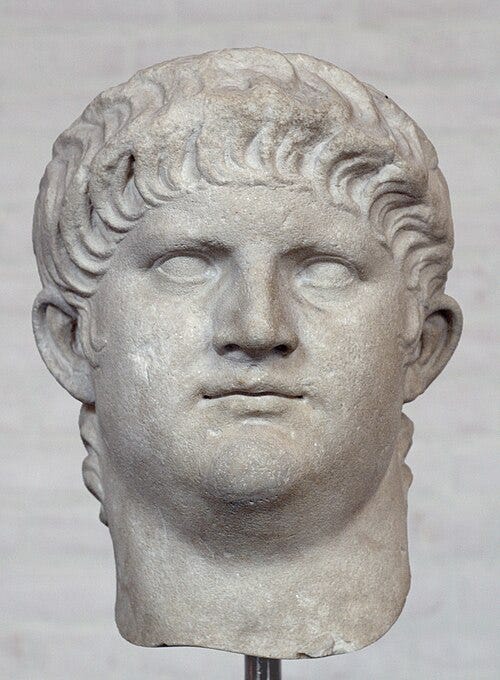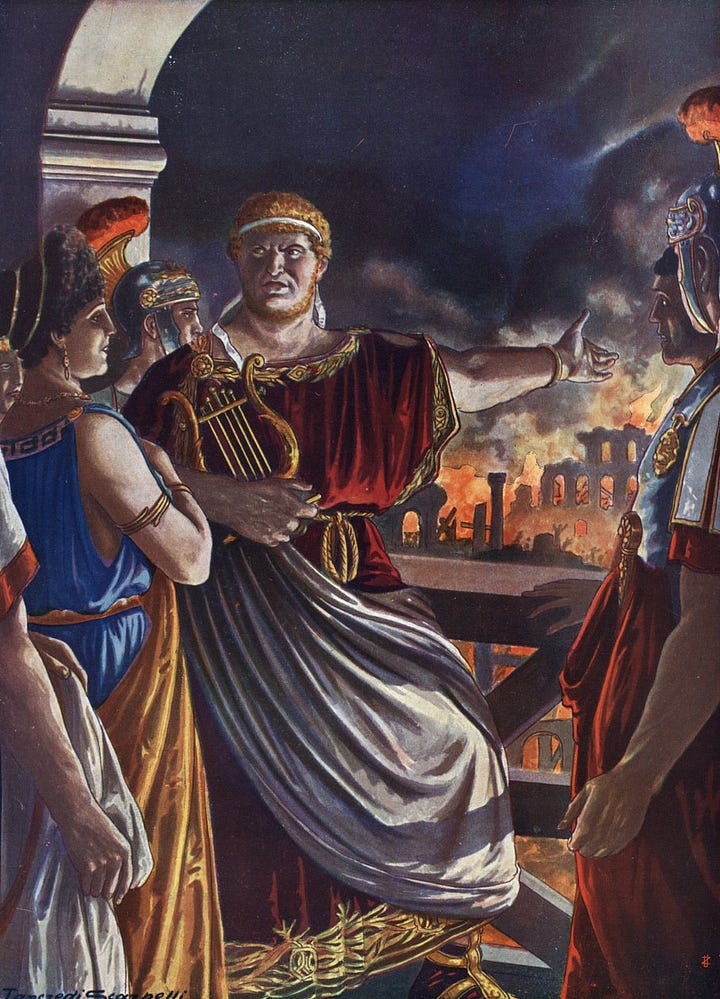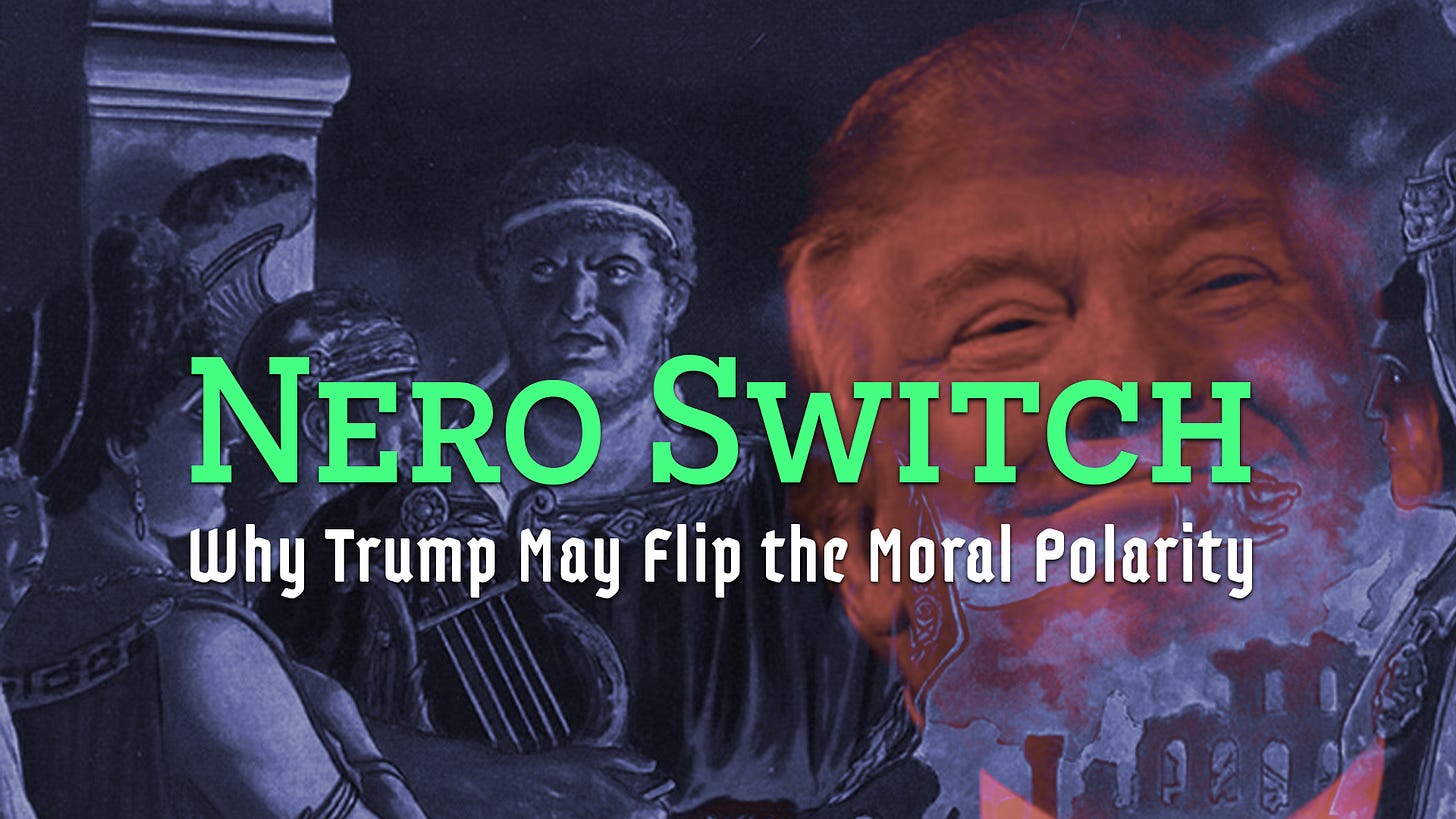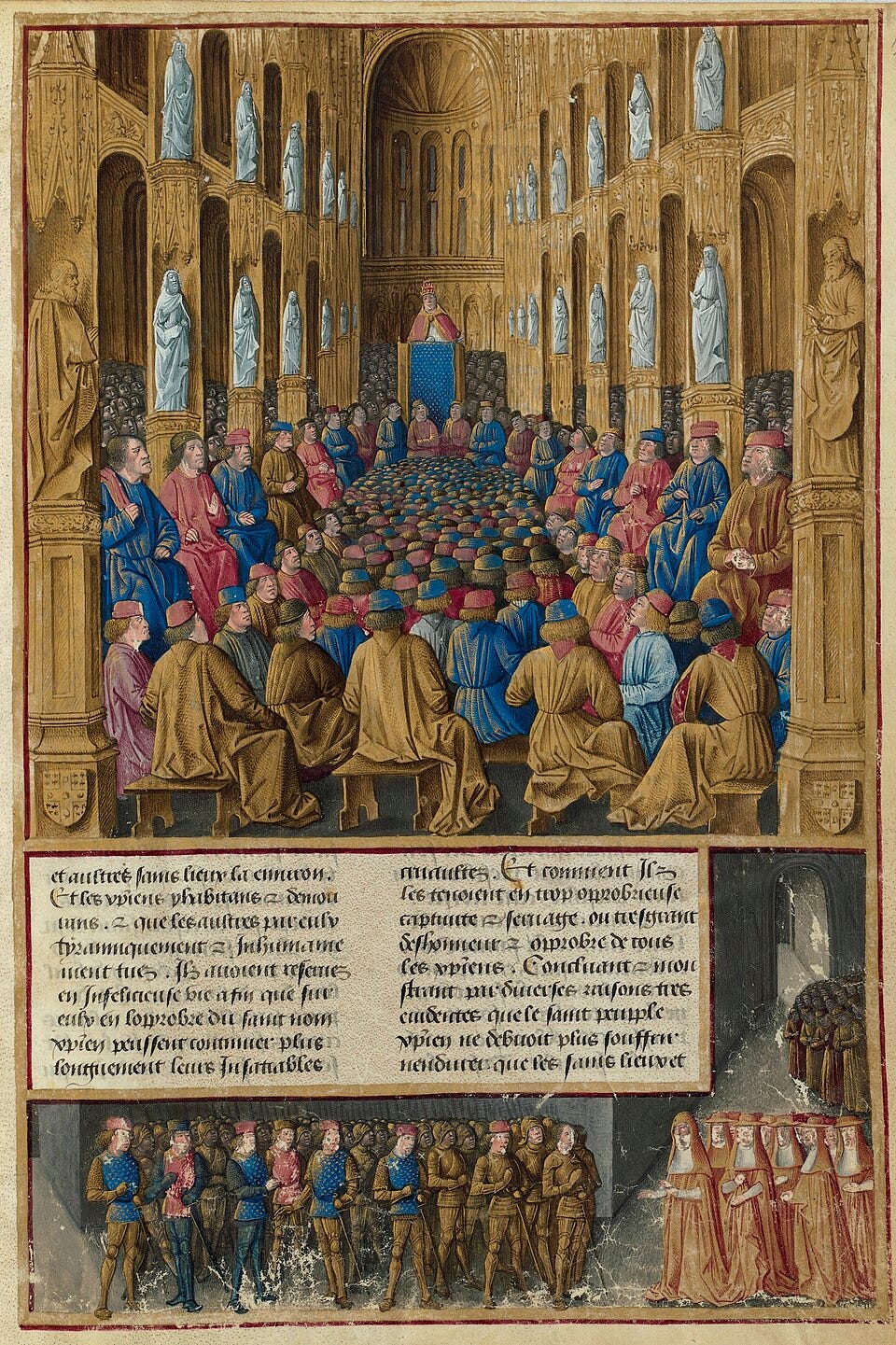Nero Switch: Why Trump May Flip the Moral Polarity
From Nero to the Crusades, every millennium or so, the moral pendulum of the world swings back—hard.
On the former Twitter, on Election Day 2025, Hillary Clinton wrote about a Trump Truth Social post:
“This is the president of the United States taking a break from gold-and-marble interior renovations to say he’ll defy a court order to feed hungry Americans.
Nero would be proud.“
The former Secretary of State is right (again).
Nero
Nero Claudius Caesar Augustus Germanicus (37–68 CE), was the last of Julius Caesar’s line. In 54 CE, he became the youngest emperor to that point, orchestrated by his mother Agrippina the Younger, who married Emperor Claudius—and probably poisoned him.


Nero’s first five years were relatively benevolent as he was counseled by the Stoic philosopher Seneca and Praetorian Prefect Burrus. His decrees improved slavery laws, established justice, and limited capital punishment.
But Nero was the human expression of the axiom “absolute power corrupts absolutely.” He became paranoid, grandiose, and grotesquely cruel. In 59 CE, Nero had his mother killed and began to stage artistic events starring himself as an actor and musician—defying the Romans who thought it was beneath him.
In 64 CE, the Great Fire of Rome burned for six days and destroyed much of the city. Many Romans believed that Nero started the fire himself in order to clear land for his Domus Aurea—the “Golden House”—a colossal, gilded palace complex.
The Birth of Propaganda—Christians as Scapegoat
When the Great Fire hit, the Roman population was angry—so Nero created a scapegoat out of a tiny cult called Christians. This is one of the earliest, clearest, and most historically important uses of political propaganda.
“To suppress the rumor, Nero fastened the guilt and inflicted the most exquisite tortures on a class hated for their abominations, called Christians by the populace.”
Tacitus, Annals XV.44
There were at most a few thousand adherents to the Christian movement when Nero used it to deflect his own guilt. It was an obscure, syncretic sect of Judaism centered on impoverished and marginalized communities who followed the teachings of a crucified Galilean prophet. But this made it the perfect scapegoat for Nero: it defied emperor-worship and preached equality before God.
However, it was Nero’s persecution of the Christians that elevated it to becoming part of the operating system for Western civilization. Tacitus described Christians “covered with the skins of beasts, torn by dogs, or set on fire.” Two of Christ’s Apostles were executed under Nero’s persecution in Rome: Peter was crucified upside-down; Paul was beheaded.
In 68 CE, Nero’s rule had imploded and he died by suicide in flight from his own Praetorian Guard. The Empire carried on, but Nero had accidentally launched the movement that would become Rome’s undoing.
By the late 2nd century, the Bishop of Rome was being used as an arbiter in disputes. Over time, the Christians essentially colonized the Roman imperial nervous system left vacant by Nero’s successors: the machine of empire became the body of Christ.
Millennial Polarity
The dominant theme of the Romans, of imperial violence justified by loyalty to the state, was flipped by the Christians to focus on the victim.
Violence as sacrifice becomes suffering as redemption.
A thousand years later, the pendulum swung back, this time dressed in Christian robes. The same movement that sprung from the cruelty of Nero gathered in 1095 CE at the Council of Clermont to hear Pope Urban II call for the liberation of Jerusalem: “Christus imperat”—“Christ commands it!” The crowd answered: “Deus Vult!”—“God wills it!”
For two centuries during the Crusades, the Western world operated under this reversed moral polarity. Faith was measured in death; obedience to God was sanctified in blood. The religion born from Nero’s lie about Christians reversed the lie to persecute Muslims and Jews. The empire of empathy became a crusade of conquest.
21st Century Nero
It’s hard to read about Nero and not think about Donald Trump: from destroying his own city to create a Golden House, to the performative cruelty of his rule, to his use of a persecution scapegoat.
Nero was not the first cruel Roman emperor, and he was not the last. However, it was the malignancy of his narcissism and the cruelty of his rule that swung a big pendulum that ended up destroying Nero and launching a movement that was based on human empathy.
Donald Trump is not the first terrible president, and he will not be the last. However, the malignancy of his narcissism, and the cruelty of his rule leads me to think that he may be the one that accidentally launches a new movement based in human empathy.
The current state of the American electorate is very dark for Donald Trump—which is exactly why he’s trying to make the electorate irrelevant. He knows none of what he‘s doing is popular, or moral. That’s why he’s threatening to starve people to make a political point, and trying to discredit the elections that prove how deeply unpopular he is.
While I’m not proposing a grand millennial theory of morality, I do think there are long moral movements and significant moral moments that define history—and humanity’s role within it. I think these pivot points are worth studying because they can help steer us through our own version.
It seems hard to argue that Donald Trump doesn’t mark something significant about humanity. The aristocratic performance art of throwing a Great Gatsby party in his gilded beach palace while defying a court order to feed hungry people is, as Hillary said, worthy of Nero himself. But what does it portend?
Based on the actual data, and the expected outcome of the elections, it doesn’t seem as if it means we’re headed towards a millennium of darkness. I don’t believe in prophecies, or gods, but I do believe in the human spirit. I couldn’t define it if you asked me, but I can feel it all around me; and I can see it on the streets.
Although Nero didn’t actually fiddle while Rome burned, he did continue to perform—just as Trump will.
“Nero, finding the calamity so similar to the ruin of Troy, sang the destruction of Troy in his usual theatrical dress.”
— Tacitus, Annals XV.39
Nero’s performance ended in ignominy—and started a revolution of empathy. History is never written in advance, but if it rhymes, we can still be its poets.
If you are able to help me continue my work, please consider upgrading to a paid subscription. It really means a lot. Thank you!
Here are a few benefits to upgrading:
Live Zoom call each Sunday
Ability to comment and access all content
Wonderful, supportive community
Helping independent journalism fill in the gaps for our failing media
Thank you for reading and sharing my work. Grateful for your support.
If you’d like to help with my legal fees: DefendSpeechNow.org.
My podcast is @radicalizedpod & YouTube — Livestream is Fridays at 1PM PT.
Bluesky 🦋: jim-stewartson
Threads: jimstewartson









Thank you for this insightful trip through ancient history. I personally believe Trump’s cruelty and narcissism might be enough to flip the cultural dynamic once enough of his supporters feel the pain of his Big Beautiful Bill … but only if they also know an alternative reality / future is possible. I am working to get the word out about this option (based on the work of social science pioneers such as Buckminster Fuller and Riane Eisler) through the Route 66 Spirit of America Museum in Stroud, Oklahoma. Here’s a link to what I’m working on…
https://route66spiritofamericamuseum.org/american-moonshot-project/
May our own praetorian guards, the Pentagonians, drive Trump to suicide -- soon. I mean, how much longer can the military allow this shit show to go on? When it's all over, there must be Nuremberg Trials for every member of this administration. They should, of course, be offered cyanide pills in lieu of hanging, just like their Heavenly Fuehrer had.